---
A quick primer on how to use CrossWalk.com to really study a verse in depth.
For starters, pick a verse about which you have some questions. :-)
Just read it and talk to the Lord about it for a while. You have to understand before you start that the paper and ink you are holding in your hand is not holy. The words on it are spiritual, but they are not magical. They are true, but they are true about Someone, and it is that Someone Who matters.
The spiritual content of the scriptures is only made known to man because the Spirit makes it known. The spiritual content of the scriptures is not knowledge, but the Person of the Lord Jesus Christ. When the Spirit makes the scriptures known to you, He is revealing Christ to you, or He is doing nothing at all.
So, spend time reminding yourself and the Lord Who it is you are really seeking when you are plumbing His word.
Then, dig out some tools!
All of the tools that I will tell you about tonight are just the discoveries of men who came before us, captured on paper and then placed on the Internet. Use these just like you would use some time alone with a trusted elder in the Lord. Except they're even cooler because you don't have to disturb anyone to use them at 5 in the morning, or 11 at night! All these guys have gone on to their reward with the Lord, so we could not disturb them if we tried. :-)
The study tools are all at bible.crosswalk.com. To get there from crosswalk.com, click on Faith then Bible Study Tools.
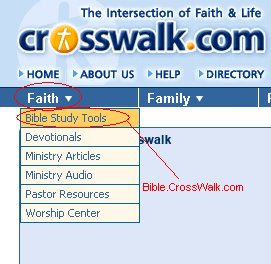
From there, enter the verse you would like to study. (You can also enter search words to study by idea, but we are going to do a whole lot better than that tonight.)
Be sure to use either the KJV or NAS with Strong's Numbers and select the Study Tools checkbox. We will be using both of those things. You might click on the Preferences link to set the bible you will use to always come up as one of these. It will save you some time in later searches.
For our little example, we will look at Matt 5:48.
(Throughout this little lesson, I am going to call this the Verse Study Page. You will keep coming back to this page throughout this lesson, so remember to click "Back" to get back to it, or use whatever other nifty trick works best for you!)
Clicking Find brings you to the Verse Study Page. Note that most of the words in the verse are underlined. This is because we chose a bible with Strong's Numbers. We will be clicking the underlined words later.
Over on the right, you see a bunch of TLA's (three letter acronyms) and 5:48 over and over and over. We'll be getting to those too! First, though, look at the bottom to see what all the TLA's stand for. You have it right when you see that DBY stands for Darby's Synopsis of the New Testament.
The first two links I recommend you click are "NTB" and "TSK," give me just a second and we will do just that!
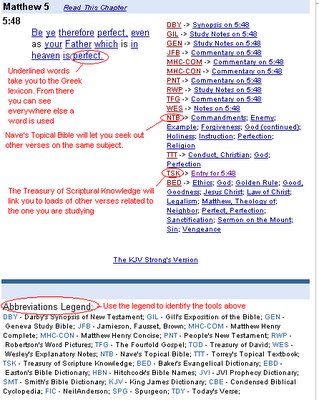 The point of this part of the verse study process is to expand our horizons.
The point of this part of the verse study process is to expand our horizons.
We could dive into the Greek and all that, but it is better to see what the rest of the bible has to say first. We want to see WHAT this verse has to say, and to do that we need to see what the rest of the bible has to say on the same subject.
For starters, click the little link at the top of the Verse Study Page that says "read chapter." There's no point in studying all over the bible if we haven't see what the verses around this one say about it.
Next, on the Verse Study Page, take a look at the NTB (Nave's Topical Bible) subjects available to us. There are 8 topics listed. Let's assume that Perfection is probably the one of most interest to us. Click the word, "Perfection."
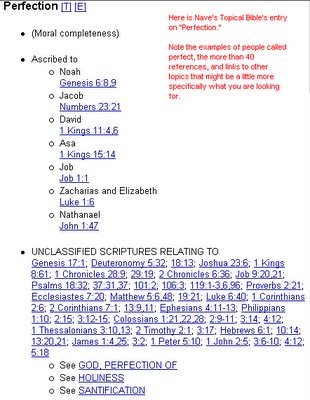 Here you find 40+ other passages of scripture that all talk about the idea of perfection. These won't tell you exactly what Matt 5:48 has to say about perfection, but they will sure open your mind to some things that Jesus might have meant when He said these words.
Here you find 40+ other passages of scripture that all talk about the idea of perfection. These won't tell you exactly what Matt 5:48 has to say about perfection, but they will sure open your mind to some things that Jesus might have meant when He said these words.
Next, on your Verse Study Page, click TSK (Treasury of Scriptural Knowledge).
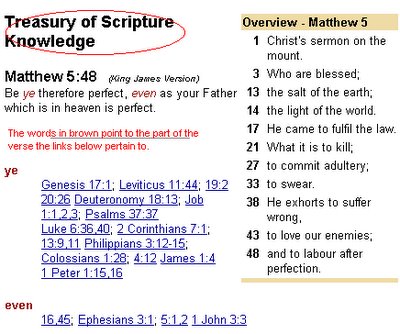 You will note that several of the TSK verses are verses you already saw in the NTB. But not all of them. The TSK follows some counter-intuitive paths in linking verses together. That's what makes it so cool! You never know what you might find, but it's worth it often as not.
You will note that several of the TSK verses are verses you already saw in the NTB. But not all of them. The TSK follows some counter-intuitive paths in linking verses together. That's what makes it so cool! You never know what you might find, but it's worth it often as not.
We have successfully expanded our horizons on this verse, so now we are ready to jump into the Greek a little bit. I don't know Greek, and statistics suggest that you probably don't either. Without loads of training we should not try too hard to track down roots of Greek words and dissect fine shades of meaning, but there are some simple tricks that we can use to great profit.
Click on the word, "perfect" in Matt 5:48 itself on the Verse Study Page, and you will be taken to the Greek Lexicon entry for the Greek word "teleios" - Perfect.
![]() We want to take a quick glance at the definitions, and make sure that we are not somewhere out in left field. We also want to click the little speaker button so that we can hear the word pronounced (we wouldn't want to embarass ourselves in front of our Greek-speaking friends, now would we ;-).
We want to take a quick glance at the definitions, and make sure that we are not somewhere out in left field. We also want to click the little speaker button so that we can hear the word pronounced (we wouldn't want to embarass ourselves in front of our Greek-speaking friends, now would we ;-).
Mostly, though, we want to look at all the other places this word is used in the New Testament. The best way for us non-Greekers to guess what might be the meaning of this Greek word is to see how it is used in other places. I have it on good authority that this is what the pros do, too. :-D
You are now deeply into the So What stage of bible study. You are, whether you mean to or not, starting to draw conclusions about what this verse really means. You are seeing what the Spirit is really telling His church by these words. You are starting to see what's really important about being perfect like your Father in heaven is perfect.
Click on the 1 Corinthians link above to see how Paul uses teleios to the Corinthians.
STOP!
There has to come a pause in this process. You've probably looked at dozens of verses all over the bible (with nothing more than a few dozen mouse clicks!), but it is time to let some of this sink in. If you can, spread all this studying out over a few days, and mingle into it liberal prayer. Let the Spirit illuminate the things you are reading, without just charging full-speed ahead in your own time.
After you think you have a pretty good idea what the So What of this verse might be, dig into some commentaries. Let some of the elders of Christianity past share with you what they thought it meant. They will confirm your insights, add to them or correct them. No matter which or what mixture of which, it is cool to read a commentary after you have taken the time to really dig into a passage.
As an example, I am showing the GIL commentary, but go ahead and click on any number of them. You will find that they each have a different flavor and focus.

And now you enter the most important stage of bible study ... Now What!
It is a mistake to gain insight into the Lord and do nothing with it. Now that you know what it is to be perfect (assuming you actually did this study along with this lesson :-O) it is time to open your heart to the Lord and let Him show you a new way to be perfect.
May the Lord bless!
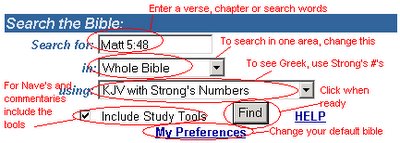
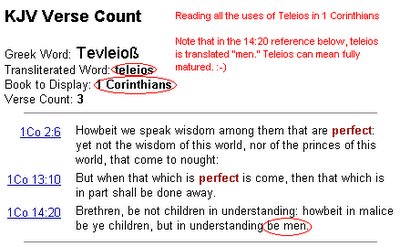

5 comments:
Cool!
Asking "now what?" is crucial. I am always asking "so what?" in all the studies I do so that I will not be labeled just an academician.
So how did your bible study go?
Codepoke,
Just wondering, I have my classmates all using Bibleworks, a bible software which I cannot afford. So I use e-Sword, with compliments of Rick Meyers at www.e-sword.net. Have you tried it? Looking at what you can do with Crosswalk, e-Sword will be like having Crosswalk offline.
Nice codepoke ... I'll have to check it out. Ditto Meghan's comments on e-sword ... I use it all the time.
CP,
Wow! This is awesome. Thanks for the info.
Ditto about E-sword.net... it is pretty great too.
God Bless
Doug
E-Sword sounds like a winner. Being on local is worth its weight in gold. I will probably have to download it soon!
I chose CrossWalk because my pastor was familar with it, so everyone could use the same tool and it would be endorsed by their leader.
Post a Comment